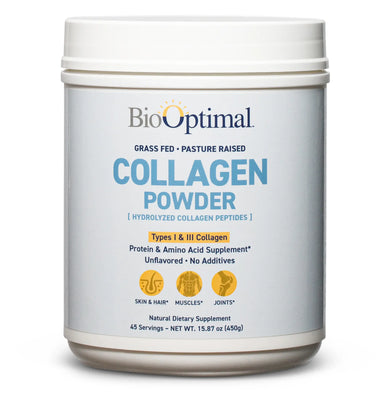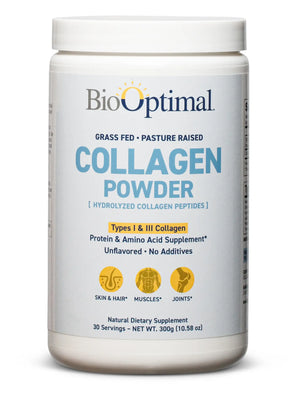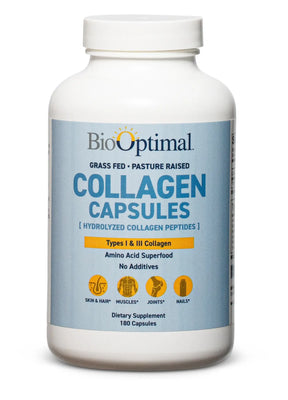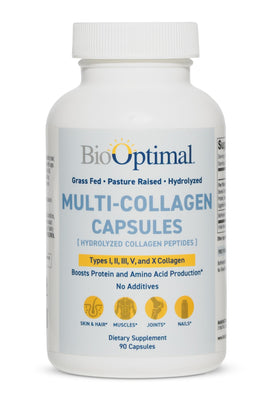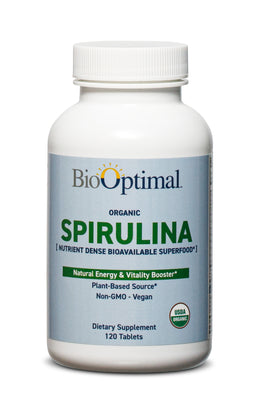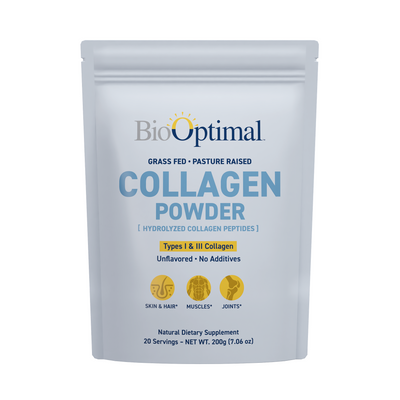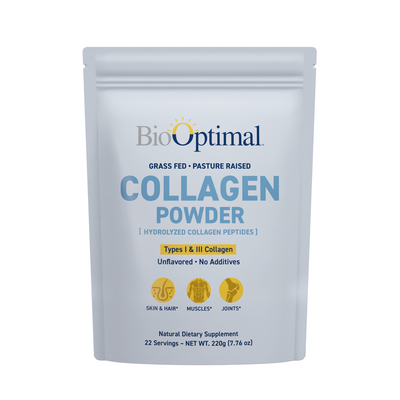Louis's takeaways:
Collagen has become one of the most popular supplements for supporting skin, joint, and bone health. However, many people also ask how much protein is in collagen and if it contributes to their daily protein intake. The answer is yes. Collagen peptides are typically 90% protein by dry weight, highlighting collagen’s high protein density and making it an efficient way to increase protein consumption.
Table of Contents:
- What Is Collagen?
- How Much Protein Is in Collagen?
- Can Collagen Count Toward Your Daily Protein Intake?
- Is Collagen a Complete Protein?
- Factors Affecting Collagen Protein Content
- Benefits and Limitations of Collagen as a Protein Source
- How to Incorporate Collagen into Your Diet?
- Frequently Asked Questions
Collagen has become one of the most popular supplements for supporting skin, joint, and bone health. However, many people also ask how much protein is in collagen and if it contributes to their daily protein intake. The answer is yes. Collagen peptides are typically 90% protein by dry weight, highlighting collagen’s high protein density and making it an efficient way to increase protein consumption . Whether you're using it to support healthy aging, muscle recovery, or general wellness, collagen can be a convenient protein source.
The growing demand for collagen reflects this trend. In fact, the global collagen supplement market was valued at $2.84 billion in 2023, showing a substantial rise in consumer interest and overall market growth. As more people look for easy ways to support their health, understanding how much protein is in collagen becomes essential for making informed dietary choices.
What Is Collagen?
Collagen makes up about 30% of the total protein content in your body. It provides structural support to connective tissues, including skin, joints, bones, tendons, and ligaments. Think of collagen as the “glue” that holds everything together.
Collagen comprises amino acids, primarily glycine, proline, and hydroxyproline. Its unique triple-helix structure gives it strength and flexibility, making it vital for maintaining healthy tissues. There are at least 28 types of collagen, but Types I, II, and III are the most common in supplements. Type I supports skin, bones, and tendons. Type II is found in cartilage, while Type III is essential for skin elasticity and organ structure.
As you age, your body produces less collagen. This decline can lead to wrinkles, joint discomfort, and weaker connective tissues. Supplementing with collagen supports your body’s natural production and helps maintain strength and elasticity over time.
How Much Protein Is in Collagen?
Collagen is a highly concentrated protein source. Collagen peptides are typically 90% protein by dry weight, making them one of the most protein-dense supplements. This high collagen protein content supports tissue repair, skin health, and muscle recovery.
Protein per Scoop of Collagen Powder
When you look at a standard serving, most products contain 10 to 20 grams of collagen protein per scoop. The exact amount depends on the brand and formulation. For example, BioOptimal's collagen powder offers a clean and consistent collagen powder protein per scoop, giving your body what it needs without unnecessary fillers.
Because collagen is hydrolyzed (broken down into smaller peptides), it’s easy to digest and absorb. The protein in collagen peptides contributes to your overall daily intake, just like other protein sources. While it lacks all nine essential amino acids, it’s an excellent supplement to pair with a balanced diet for full protein support.
Protein in Bone Broth and Collagen-Rich Foods
Bone broth and collagen-rich foods offer varying amounts of protein depending on their preparation. One cup of bone broth contains 6 to 12 grams of collagen protein, but the exact amount can vary based on cooking time, ingredients (like bones and connective tissues), and concentration.
Homemade bone broth tends to have higher collagen protein content than store-bought versions. Collagen-rich foods like chicken skin, fish skin, and pork rinds also contain collagen, but in lower amounts. While beneficial, these sources may not deliver as much protein in collagen peptides as supplements.
Can Collagen Count Toward Your Daily Protein Intake?
Yes, collagen supplement protein can count toward your daily protein intake—but with some important context. Collagen lacks sufficient amounts of tryptophan, an essential amino acid, making it an incomplete protein. This makes it unsuitable as a protein source if you aim for complete amino acid coverage.
However, the incomplete protein collagen still plays a valuable role. It’s rich in glycine, proline, and hydroxyproline—amino acids that specifically support skin, joints, tendons, and bones. When calculating your total daily protein, you can include collagen, especially if it’s part of a varied diet that provides complete proteins from other sources like eggs, dairy, meat, or legumes.
Use collagen supplement protein alongside other protein sources throughout the day to get the most benefit. This helps ensure you meet your total protein needs and get all essential amino acids needed for general health and muscle maintenance.
Collagen vs. Other Protein Sources
Collagen differs from whey and plant proteins in amino acid profile and function. Collagen supplement protein supports connective tissue, while whey and plant proteins better support muscle building due to their complete amino acid profiles.
Collagen vs. Whey Protein
Whey protein has nine essential amino acids and is rapidly absorbed, making it ideal for muscle growth and recovery. Collagen lacks tryptophan, making it an incomplete protein, but it’s rich in amino acids that support joints, skin, and connective tissue. Use whey for post-workout recovery and collagen for skin, joint, and aging support.
Collagen vs. Plant Proteins
Plant proteins like pea, hemp, and soy are either complete or nearly complete but may be less digestible than animal proteins. Collagen is easily absorbed but is an incomplete protein. Plant proteins are better for muscle building, while collagen supports joint, skin, and tendon health. Use them together for balanced nutrition.
Is Collagen a Complete Protein?
No, collagen is not a complete protein. Collagen supplement protein is low in or completely missing tryptophan, critical for muscle repair, mood regulation, and other body functions.
Because it’s an incomplete protein, collagen should not replace complete proteins in your diet. However, collagen is rich in glycine, proline, and hydroxyproline—amino acids rare in most diets but essential for healthy skin, joints, and connective tissue.
You can still include collagen supplement protein in your daily intake, but it should be paired with complete proteins from other sources like meat, eggs, dairy, or legumes. This will ensure that you get all the essential amino acids your body needs for overall health and muscle maintenance.
Factors Affecting Collagen Protein Content
How source, processing, and hydrolysis level change protein yield
The collagen protein content in supplements and food can vary based on several factors. The source of collagen, its type, how it's processed, and the degree of hydrolysis all impact protein yield and absorption. Clarity regarding these differences can help you choose the right product for your health needs.
Source & Type of Collagen
Collagen is derived from different animal sources, each with slightly different amino acid profiles and benefits-

- Bovine Collagen—Sourced from cows, this is rich in Types I and III. It provides skin, bone, and joint health and is the most common supplement type.
- Marine Collagen—It is derived from fish skin and scales. It offers smaller peptides for better absorption. It has Type I collagen, which is ideal for skin and hair support.
- Porcine Collagen- Made from pigs, it’s compositionally similar to bovine and rich in Types I and III. It's effective but less commonly used due to dietary preferences.
Degree of Hydrolysis
Hydrolysis breaks collagen into smaller peptides, making it easier to digest and absorb. Highly hydrolyzed collagen peptides typically have a higher protein percentage and better bioavailability. This improves the efficiency of collagen supplement protein in the body, especially for joint, skin, and tendon support. Lightly hydrolyzed forms may have lower absorption.
Benefits and Limitations of Collagen as a Protein Source
The following are some of the benefits and limitations you experience with collagen as a protein source-
Benefits for Skin and Joints
Collagen supports healthy skin elasticity and hydration and reduces the appearance of fine lines. It plays a crucial role in joint comfort and flexibility by strengthening cartilage and connective tissue. Regular intake can promote healthy aging and mobility.
Limitations for Muscle Building
Collagen is an incomplete protein lacking tryptophan, which limits its use for muscle growth. While it supports tendon health and recovery, it doesn't stimulate muscle protein synthesis as effectively as complete proteins like whey or soy.
Balanced Use
Use collagen as a supportive protein, not your sole source. Pair it with complete proteins to meet your full amino acid needs. This approach helps you benefit from collagen’s unique properties while maintaining overall protein balance.
How to Incorporate Collagen into Your Diet?
You can include collagen in your diet and enjoy its optimum benefits when you follow the tips shared below-
Serving Tips
Add 1–2 scoops of collagen powder protein per scoop to coffee, smoothies, oatmeal, or soup. It's flavorless and dissolves easily in hot or cold liquids.
Best Timing
Collagen can be taken at any time of day. Some prefer it in the morning with coffee or post-workout with a smoothie. Consistency matters more than timing.
Pair with Vitamin C
Vitamin C helps with collagen synthesis in the body. To maximize results, combine collagen with foods like citrus, berries, or a vitamin C supplement. This simple step helps your body make the most of the protein in collagen peptides.
Frequently Asked Questions
1. Can I count collagen as protein?
Yes, you can count the grams of collagen protein toward your daily intake. However, collagen is an incomplete protein, lacking tryptophan and other essential amino acids. Experts recommend collagen make up no more than 30–40% of your total daily protein to maintain a balanced amino acid intake.
2. How much protein is in 1 scoop of collagen?
A single scoop of collagen powder protein per scoop typically provides 9 to 18 grams, depending on the brand and scoop size. Always check the label for exact amounts, as formulations and serving sizes vary between products. This helps you accurately track your collagen protein content.
3. Is collagen a good protein source?
Collagen is a good source of protein for skin, joints, etc., due to its high levels of glycine and proline. However, due to its incomplete amino acid profile, collagen is less effective for muscle building. Use it as a supplement, not a primary muscle-building protein.
4. Can collagen cause heartburn?
Some individuals may experience bloating, heartburn, or digestive upset after taking collagen. This could be due to additives, fillers, or individual sensitivity. To reduce risk, choose a clean, high-quality collagen powder with minimal ingredients and consult your healthcare provider if symptoms persist or worsen.
5. Can I take collagen instead of protein?
No, collagen supplement protein should not replace complete protein sources. Collagen lacks essential amino acids like tryptophan and does not support muscle synthesis alone. Use it as an additional protein source alongside a balanced diet that includes complete proteins from meat, eggs, legumes, or dairy.
6. What to avoid when taking collagen?
To maximize collagen’s effectiveness, avoid low vitamin C intake, which limits collagen synthesis. Also limit high sugar diets, smoking, and unprotected UV exposure, which degrade collagen. Don’t rely solely on collagen for protein—include complete proteins and healthy lifestyle habits to support overall collagen production.


